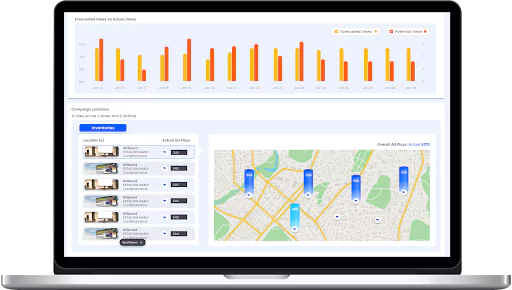Turn your screens into revenue engines. These five SSP capabilities don’t just support your DOOH campaigns; they drive predictable, scalable revenue.
Key takeaways
- Media owners are using SSPs to automate how ad space is sold, updated, and optimised in real-time.
- Attract global buyers in addition to local demand with a marketplace for your inventory.
- Real-time reporting turns every impression into optimization opportunities by tracking what’s working and what drives ROI. With customization and transparent pricing, media owners can maximize returns and safeguard brand integrity.
- Reduce operational cost by 40% with automated inventory management.
- SSPs are essential for scaling modern DOOH networks and enabling consistent revenue from diverse demand sources.
Why SSPs Are Becoming Essential for Modern Media Owners
While DOOH spends towards $54 billion by 2030, most media owners are still stuck with manual processes, leaving money on the table every single day.
The DOOH space is growing fast and becoming more complex. While owning screens in high-traffic areas was once enough, media owners today face a new challenge: How do you fill those screens continuously, efficiently, across markets, with the right content but without the manual hustle?
The answer lies in a reliable SSP (Supply Side Platform) Partner. More than a scheduling tool, your SSP connects you to buyers, automates transactions, and keeps you in control of every ad that plays on your inventory.
Just like e-commerce sellers leveraging Shopify or Amazon to sell smarter and faster, DOOH operators need a performance-first SSP to scale their business.
Is Your Network Ready to Meet Global Demand?
Here’s the reality check: DOOH ad spend hit $25.8 billion in 2023, and it’s set to more than double by 2030, crossing $54 billion. Yet many media owners still rely on static schedules and manual deal-making, leaving screens under-monetized and teams focusing on spreadsheets instead of strategy.
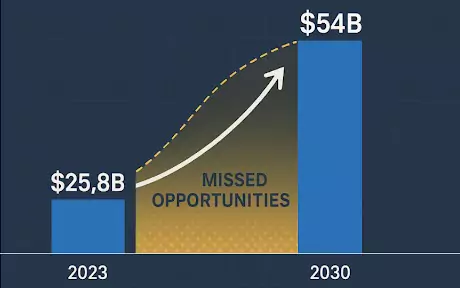
Data source: Maximize Market Research – Digital Out-of-Home (DOOH) Market Report
While you’re reading this, automated networks are capturing market share with:
- Over 50% of advertisers now include DOOH in multichannel digital campaigns – without tracking, you’re flying blind on million-dollar revenue opportunities
- Advertisers expect real-time campaign activation, especially in programmatic DOOH, which is growing at 31.5% CAGR
76% of consumers say they’ve taken action after seeing a DOOH ad, making performance tracking essential for proving ROI. To capture your share of this booming market, you need an SSP that automates deals, adapts in real time, and delivers the actionable insights that advertisers expect and that drive the bottom line.
Not All SSPs Are Built for DOOH, Here’s Your Guide to Finding the Perfect Partner
Before choosing a platform, make sure your SSP is purpose-built for DOOH. Here are five features that separate scalable solutions from the rest:
1. Programmatic Automation
Save 15+ hours per week on manual scheduling
Manual selling is quickly becoming a thing of the past. In today’s fast-moving ad world, speed and precision matter more than ever and that’s where programmatic automation comes in. With a smart SSP in place, transactions are no longer handled through endless back-and-forth emails or manual booking sheets. Instead, they’re executed automatically, in real-time.
This shift dramatically reduces turnaround times and lightens the load for operations teams, allowing for more operational capacity.
Campaigns that once took days to finalize can now be launched in minutes.
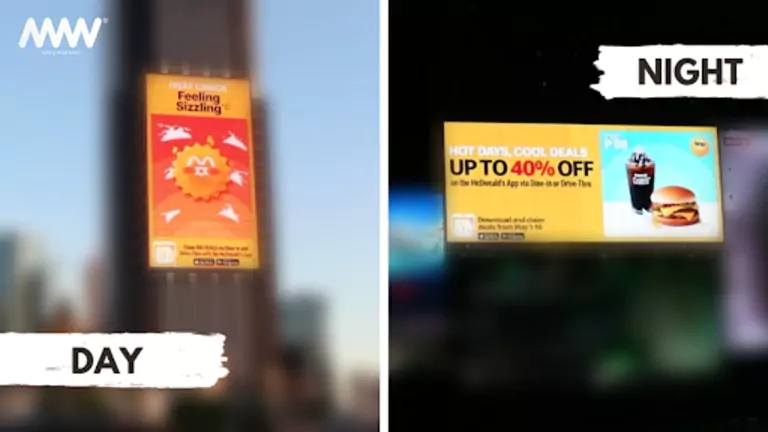
Buyers can set conditions like the time of day, weather changes, or traffic patterns and the SSP will instantly trigger the planned ad at that exact moment. Learn how McDonald’s uses dynamic DOOH to unlock deals based on real-time weather conditions in the Philippines.
Imagine a coffee brand running warm drink ads only on chilly mornings, or hotels offering night stay promotions when flights are delayed or shopping malls pushing umbrella sales during sudden downpours. Programmatic automation makes that level of responsiveness not just possible but easy. It’s efficient, scalable, and built for the demands of modern advertising.
2. Global Buyer Access
International brands typically pay 30 – 50% higher CPM’s than local advertisers
Think beyond the usual advertisers you’ve always worked with. Modern SSPs give you access to a global demand pool opening your screens to brands you may have never interacted with before. Imagine a multicultural FMCG brand running a product launch across Asia or a travel platform pushing hyperlocal deals in real-time. With the right SSP, you’re not just filling empty ad slots – you’re unlocking new revenue streams from high- value buyers all over the world.
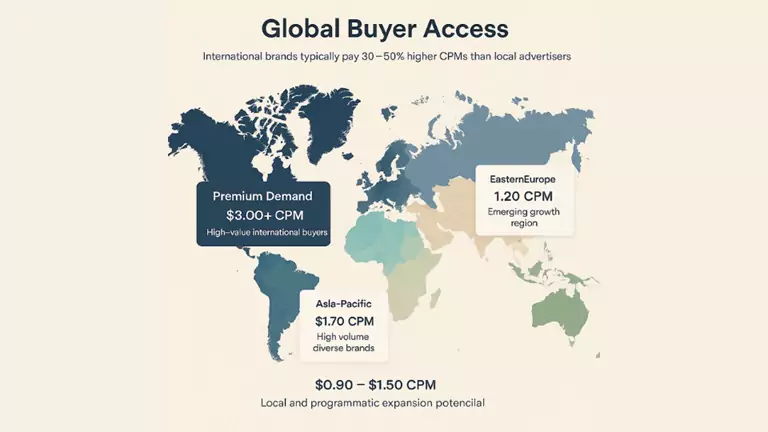
Data source: Publift
3. Advanced Reporting
Turn every impression into optimization
Smarter monetization starts with smarter reporting and the best SSPs make that easy.
You shouldn’t have to wonder if your campaign worked. With today’s leading SSPs, real-time dashboards give you everything you need to know: impressions, dwell time, buyer activity, and even which creatives are actually performing.
But it doesn’t stop there. Leading platforms can actually show you if someone walked into a store and bought something after seeing your ad. Now that’s a real-world impact you can measure.
All of this rich data isn’t just vanity metrics – it helps you fine-tune future campaigns and gives you solid proof points when pitching to new advertisers.
4. Transparency & Control
You’re running an online marketplace for your Inventory- with rules you define
If your Screens are up for sale, You deserve to know exactly who’s buying, how often they’re buying, and what they’re paying for your inventory. The best SSPs give you real-time visibility into buyer activity and pricing, so you have full control over how your inventory is being used.
You can set floor prices to protect your value, block certain ad categories that don’t align with your brand, or prioritize premium partners who bring in consistent revenue. You’re not just filling ad slots – you’re running an online marketplace for your DOOH inventory with rules you get to define.
This level of transparency builds confidence, reduces fraud, and helps build better relationships with media buyers. Transparency is becoming a cornerstone of DOOH success, especially in emerging markets where trust is still being built. When everyone sees the full picture, everyone wins.
5. Customization & Flexibility
Monetize context, not just impression
Your network spans quiet residential elevators and bustling airport terminals, yet too many SSPs treat every screen the same. For modern media owners, you need a platform that adapts to each location, audience, and moment so you can monetize context, not just impressions. Treat each screen as the unique revenue driver it really is with:
- Dynamic triggers: Automatically swap creatives based on live events, time of day, or weather. Rainstorm? Push ride-hailing or umbrella ads. Local festival? Serve event promotions without manual updates.
- Contextual monetization: Command higher CPMs by matching inventory to real-world conditions and audience intent.
Instant updates based on live signals ensures your content stays relevant, drives higher engagement, and makes your ad offering more attractive to brands.
Case Study: AirAsia’s Dynamic DOOH Rollout Across Malaysia
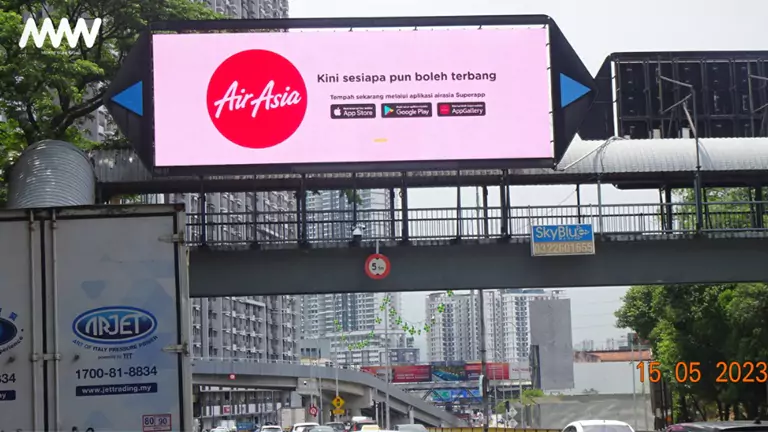
Image source: AirAsia x Moving Walls Campaign
AirAsia’s seven-week programmatic DOOH rollout with Moving Walls shows exactly why and how the right SSP partner can boost both efficiency and revenue for media owners.
By automating creative updates based on region, timing, and route availability, media owners no longer need to juggle manual uploads or risk running stale ads, so every screen stays contextually relevant and maximizes yield.
How it works:
- Dynamic, location-aware creatives: Ads Automatically swap week by week across transit hubs and high-footfall urban sites to highlight the hottest regional flight deals.
- SSP-driven automation: No manual intervention required, screens pull the right creative at the right time via programmatic triggers.
- Operational savings:What would have taken 3 full time members was handled automatically, freeing your team to focus on strategy, not file management
The results?
- 29 million impressions delivered across 37 sites and 10 districts
- Real-time creative swaps tailored by location and timing
- Seamless execution via SSP automation, saving operational time and ensuring relevance
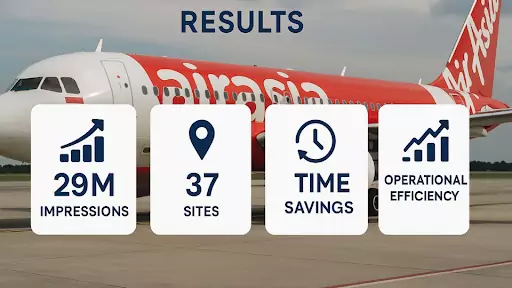
How A Shopping Mall Chain Turned Underused Screens into a Steady Revenue Stream
A Southeast Asian mall chain was struggling to monetize its in-mall digital screens. Most ad sales were handled manually, with limited outreach beyond local retailers. This meant low fill rates, inconsistent pricing, and underutilized inventory, especially during non-peak hours.
By adopting a programmatic SSP, the chain connected its screens to multiple demand sources, enabling automated ad buying from both local and international brands. The team used real-time analytics and footfall heatmaps to identify high-traffic zones and apply dynamic pricing, making premium screens more valuable.
Within three months, they saw a 38% increase in ad revenue and a steady pipeline of new campaigns without adding headcount or increasing sales efforts. The SSP helped them manage sales, increase visibility, and improve how inventory was packaged and sold.
A similar outcome was achieved with the ZOHO Workplace DOOH campaign in India, powered by Moving Walls. Media owners can maximize every screen’s potential by leveraging dynamic activation across locations, enduring timely and contextually relevant content without manual intervention.
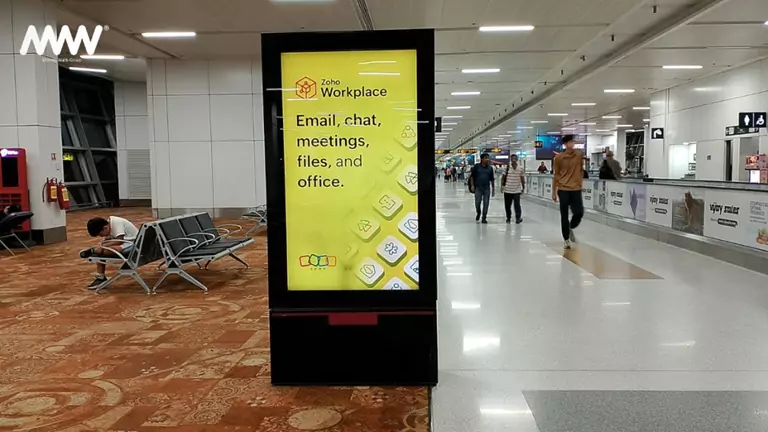
Looking for the Right SSP Partner? We Have You Covered
Your SSP solution success checklist:
- Does it support DOOH-specific targeting (weather, time, location)?
- Is the dashboard user-friendly and real-time?
- Can it connect to both local and global demand platforms?
- Do you retain control over buyers and pricing?
- Can it integrate with your current CMS?
- Does it scale across multiple screen formats and locations?
- Does it provide 24/7 support and onboarding assistance?
Your Screens Should Do More Than Just Display Ads
A modern SSP transforms your screens into high-performing revenue channels by automating sales, adapting in real time, and connecting you to ready buyers.
If you’re still relying on manual deals and static schedules, it’s time to modernize. With the right SSP in place, you can sell your inventory faster, optimize yield on every rotation, and free your sales team to focus on strategic growth initiatives.
Scale up your OOH Ads with better ROAS today.
